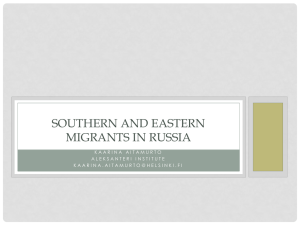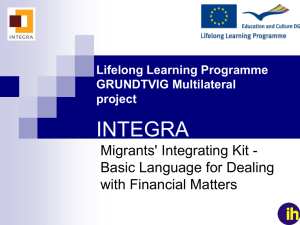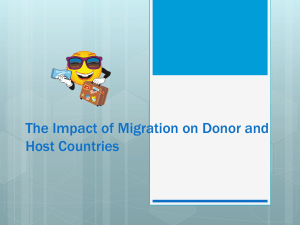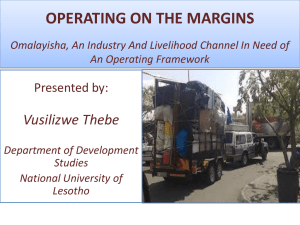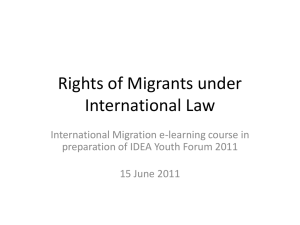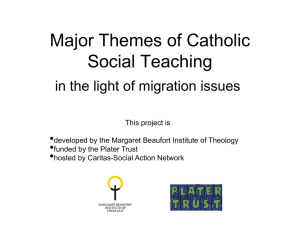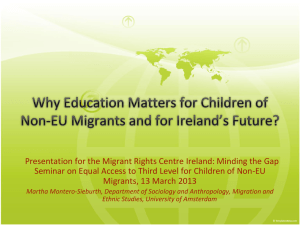Income, Wage Fairness Perceptions and Job Satisfaction among
advertisement
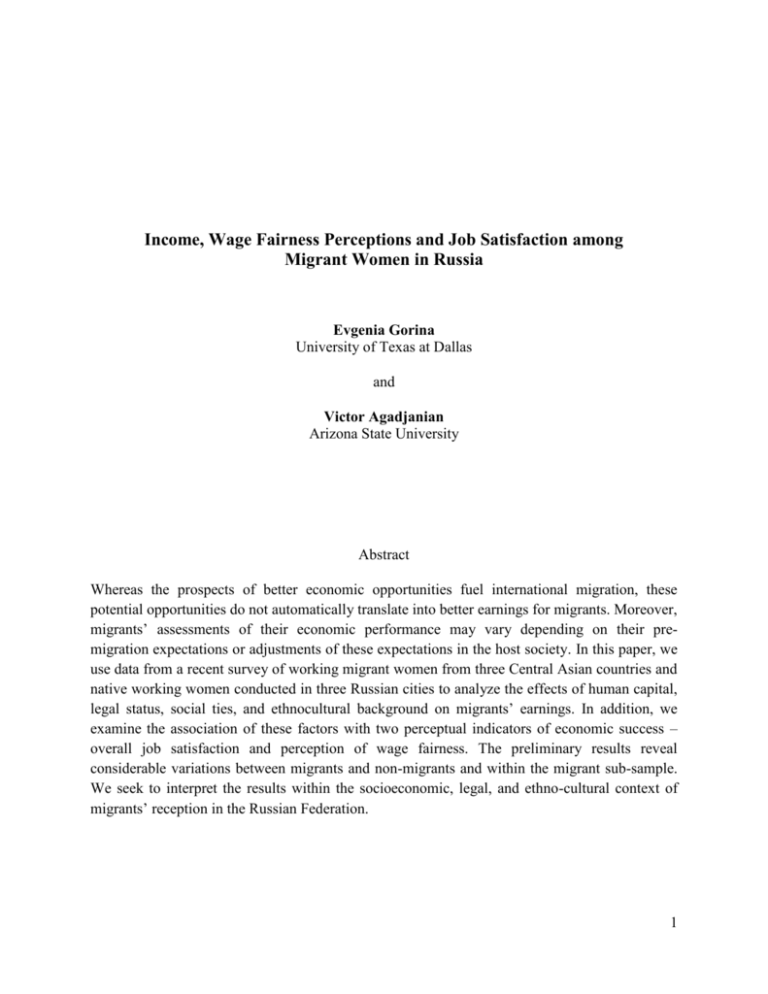
Income, Wage Fairness Perceptions and Job Satisfaction among Migrant Women in Russia Evgenia Gorina University of Texas at Dallas and Victor Agadjanian Arizona State University Abstract Whereas the prospects of better economic opportunities fuel international migration, these potential opportunities do not automatically translate into better earnings for migrants. Moreover, migrants’ assessments of their economic performance may vary depending on their premigration expectations or adjustments of these expectations in the host society. In this paper, we use data from a recent survey of working migrant women from three Central Asian countries and native working women conducted in three Russian cities to analyze the effects of human capital, legal status, social ties, and ethnocultural background on migrants’ earnings. In addition, we examine the association of these factors with two perceptual indicators of economic success – overall job satisfaction and perception of wage fairness. The preliminary results reveal considerable variations between migrants and non-migrants and within the migrant sub-sample. We seek to interpret the results within the socioeconomic, legal, and ethno-cultural context of migrants’ reception in the Russian Federation. 1 Income, Wage Fairness Perceptions and Job Satisfaction among Migrant Women in Russia Extended abstract Background and conceptualization Perceived economic opportunities in the receiving country, relative to those available in the country of origin, are at the core of most explanations of international labor migration. However, upon a migrant’s arrival in the host society, its potentially favorable labor market opportunities do not automatically translate into better earnings. Migrant workers in similar host environments display a wide range of economic outcomes. Moreover, migrants’ assessments of their economic performance may vary depending on their pre-migration expectations or adjustments of these expectations while already in the host society. In this paper, we focus on migrants’ objective success, measured by their earnings, and their subjective assessments of that success. Specifically, in addition to actual income, we examine two perceptual indicators of economic wellbeing – perception of wage fairness and overall job satisfaction. For the potential economic opportunities and expectations of economic benefits to translate into actual earnings, several forces should come into play. The most direct factors are those that have to do with migrants’ human capital. Another important factor is migrants’ legal status which may affect labor market outcomes in less direct but no less potent ways – for example, by constricting the negotiation space when it comes to wages or by prohibiting migrants’ access to better paying positions. Less obvious yet potentially important influences on migrant labor market outcomes may originate from their personal networks. Finally, these outcomes may be impacted by migrants’ ethnocultural backgrounds. In this paper we explore the relative importance of these four types of factors for migrants’ earnings, their perception of wage fairness, and their job satisfaction using recent survey data on working women migrants from Central Asia and their native counterparts in urban Russia. Although our sample consists only of women and therefore does not allow us to examine gender differences in migrants’ economic outcomes, our theoretical reasoning and interpretation of empirical findings are guided by the vast evidence that migrants’ labor force experiences in the host society are highly gendered. 2 Data and method We use data from a survey conducted in three Russian cities—Moscow, Yekaterinburg, and Novosibirsk—in 2012-2013. The survey targeted three largest migrant groups —Kyrgyz, Tajiks, and Uzbeks—and included a control group of non-migrant (native) women. Because the vast majority of female Central Asian migrants work in eateries (mainly as waitresses and cleaners), semi-formal produce and clothing bazaars (as stall owners and/or vendors), and formal retail and grocery stores (as sales clerks and cleaners), the survey focused on women working in these economic sectors. The respondents were identified through a combination of time-location sampling (eateries and retail) and random walk algorithm (bazaar). The analytical sample includes 937 women aged 18-40, about three-fourth of whom were international migrants (onefourth from each ethno-provenance group) and one-fourth were Russia’s natives (among whom we do not separate internal migrants). Table 1 presents the descriptive statistics for the analytic sample. To test our conceptual framework we fit multivariate regression models. For each outcome of interest, a pair of models is fitted—one for the entire sample and another for the migrant subsample so that we can better identify factors that are shared by migrants vs. those that are unique to certain migrant subgroups. In this extended abstract, we present the results of preliminary models. These models will be further fine-tuned as we prepare the paper for the conference presentation. Preliminary results We start with a pair of OLS models predicting total monthly income. The results of these and other models are presented in Table 2, Section A. The results show that legal status and education have positive effects on income. Within the migrant subgroup, women with more relatives living in the city tend to have higher income (although the effect is marginally significant). The sector of employment also has a significant effect on income. Finally, we detect ethnic differences in income within the migrant subsample; interpretation of these differences requires additional examination that would take into account the diversity of group migration trajectories. In the second section of Table 2 (Section B), we present the results of a logistic regression model predicting perceived fairness in wages, compared to wages of other women of Russian 3 ethnicity in the same occupations. Here the dependent variable is a dichotomy: if the respondent thinks that other women of Russian ethnicity earn more on the same type of job, it is coded “1”, “0” if otherwise. The model controls for monthly income in addition to other characteristics. As can be seen, nativity and legal status matter in perceptions of fairness whereas education has no effect. Women who found their current jobs themselves or with relatives’ help are less likely to feel discriminated against in wages. Again, there are some differences within the migrant subsample; these differences will be further explored as we continue working on the paper. The last section of Table 2 (Section C) displays the results of a logistic regression model predicting complete satisfaction with current job (as opposed to being partially satisfied or unsatisfied). The model includes the same covariates as the previous model. Here, legal status does not seem to have any effect. Respondent’s educational level does not affect job satisfaction either. Interestingly, respondents who found their current jobs with the help of relatives are more likely to be satisfied with them than those who found their jobs through other channels. The results also show considerable variation across the sectors of employment. Finally, there is again significant variation across migrant groups. Next steps As we continue to work on the paper and prepare it for the conference presentation, we will refine our theoretical and empirical models taking full advantages of the rich data at our disposal. These further analyses will focus on identifying and measuring other dimensions of migrants’ economic performance (especially, those related to types and nature of their occupations) and their perceptions of their performance and on exploring and explaining variations in these outcomes within Russia’s legal, economic, and ethnocultural context. 4 Table 1. Respondents’ selected characteristics Variable Age (mean) All Moscow Novosibirsk & Yekaterinburg Ethnicity/provenance Kyrgyz Tajik Uzbek Native ALL 29 29 29 30 31 29 31 32 29 30 30 30 30 30 29 Regular partner, married or unmarried (%) All 63 Moscow 64 Novosibirsk & Yekaterinburg 61 71 75 64 71 73 68 70 66 76 69 69 67 Some university education (%) All Moscow Novosibirsk & Yekaterinburg 22 23 22 14 13 17 39 39 40 31 32 29 23000 30000 16000 20000 22000 16000 Number of other people sleeping in the same room as her (mean) All 3.9 2.8 2.8 Moscow 5.0 3.4 3.5 Novosibirsk & Yekaterinburg 2.2 1.9 1.8 1.1 1.1 1.1 2.6 3.2 1.8 Years continuously lived in current city, mean All 2.8 Moscow 2.2 Novosibirsk & Yekaterinburg 3.5 2.9 2.4 3.5 7.3 6.5 8.5 4.2 3.8 4.9 Has at least one close adult kin living elsewhere in same city (%) All 69 92 60 Moscow 70 97 59 Novosibirsk & Yekaterinburg 68 84 61 76 70 84 74 74 74 Years continuously lived in Russia, migrants only, ( mean) All 3.0 3.9 Moscow 2.4 3.6 Novosibirsk & Yekaterinburg 3.9 4.4 3.0 2.5 3.7 n/a n/a n/a 3.3 2.9 4.0 RF citizen, migrants only (%) All Moscow Novosibirsk & Yekaterinburg 11 3 22 n/a n/a n/a 24 14 38 46 53 37 Total personal monthly income, RUR (mean, rounded to 1000) All 24000 18000 18000 Moscow 25000 20000 18000 Novosibirsk & Yekaterinburg 20000 15000 17000 42 34 54 3.8 3.6 4.1 19 6 38 5 Table 2. Labor market outcomes: earnings - OLS, perceived unfairness and job satisfaction - logistic regression parameter estimates Predictors and controls Kyrgyz Uzbek [Tajik] Native Migrant who is a Russian citizen or permanent resident [Migrant who is not a Russian citizen or permanent resident] A. Total monthly income (in thousands of Russian Rubles) All Migrants 4.299 -0.301 6.371 6.070 B. Perceived unfairness in wages (compared to other women in the same positions) All Migrants ** ** ** 3.998 ** Total monthly income -2.004 Found the job her self 1.588 [Found the job with the help in all the other ways] Works in retail Works in an eatery [Works in a bazaar] Has another job -1.729 ** -0.542 ** -0.003 All salary is paid officially Found the job with the help of relatives -0.316 -0.867 + 0.160 1.358 -0.464 0.032 -2.459 -1.728 * 8.033 ** Moscow [Novosibirsk or Yekaterinburg] Age Some university education 7.520 0.122 3.921 ** Father has/had university education Had permanent partner Has close adult kin living elsewhere in city 1.452 1.040 0.604 + ** -4.508 -2.949 ** 4.336 0.199 2.634 ** -1.035 1.237 1.291 ** ** ** + -0.408 -0.679 ** -0.523 ** -0.291 -0.385 ** -0.008 -0.104 0.040 * ** 0.307 ** 0.213 -0.432 -0.482 -0.016 -0.131 0.300 0.027 0.228 ** -0.500 0.607 0.190 0.567 * 0.182 0.367 ** ** 0.192 -0.010 -0.120 0.314 ** -0.039 0.240 0.725 0.079 0.736 ** 0.571 0.861 ** ** -0.022 -0.023 -0.130 * 0.332 + + Believes that hard work is important for success -0.672 Believes that connections are important for success Has reported at least one discrimination in 12 months Years spent in Russia ** Intercept 10.07 9.825 Fit statistic (R-square, Chi-square) 0.164 0.263 Number of cases 937 690 Notes: Reference categories in brackets; significance levels: ** <.01, * <.05, + <.10 + + -0.158 -0.031 0.089 Migrants -0.143 -0.476 * + All ** -0.011 0.272 C. Overall complete job satisfaction ** 0.042 ** 1.467 78.43 937 -0.627 * 0.096 ** 1.186 -0.056 1.138 86.92 690 -0.052 -0.308 -0.280 -0.029 -1.109 82.66 937 -0.162 0.013 -1.861 83.20 690 ** + * * ** 6
